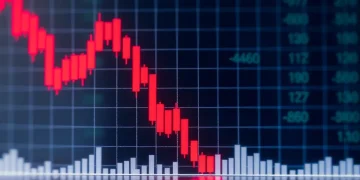US President Donald Trump’s recent warning to foreign governments about the costs associated with lifting sweeping tariffs has intensified uncertainty in global financial markets. The president described the tariffs as necessary “medicine,” but the announcement has sparked significant market turmoil, with Asian stocks experiencing steep losses and US stock futures opening sharply lower.
Investors are concerned that the tariffs could lead to higher consumer prices, reduced demand, decreased confidence, and potentially trigger a global recession. The announcement, which follows last week’s tariff increase plans, has resulted in retaliatory measures from China, further raising fears of a global trade war.
Although Trump has downplayed the impact of the market losses, which have already wiped trillions of dollars in value from global share markets, the ongoing economic uncertainty is pressing. Trump indicated that foreign leaders from Europe and Asia are seeking to negotiate tariff reductions, with the president emphasizing that these negotiations would not take place unless foreign governments agreed to pay substantial sums on a yearly basis.
The debate on the long-term nature of the tariffs continues, with some questioning whether they signal a permanent shift in US trade policy or if they are a negotiating tactic. Senior US officials have sought to portray the tariffs as part of a strategic repositioning in the global trade system. However, the situation remains fluid, and investors are reacting quickly to the evolving trade landscape.
In Japan, one of the US’s closest allies in Asia, the stock market experienced significant losses, with the Nikkei index dropping to a 1.5-year low. Japanese banks, some of the world’s largest lenders by assets, have seen substantial reductions in their market value in recent days. This sell-off follows mounting concerns that the risk of a recession could lead to potential US interest rate cuts as early as May.
Economists have revised growth projections for the US, with JPMorgan estimating that the tariffs could result in a decline in GDP by 0.3 percent, a significant downward revision from earlier forecasts. Unemployment is expected to rise to 5.3 percent, up from the current 4.2 percent.
As the trade conflict continues, some countries are actively seeking to negotiate with the US to avoid the proposed tariffs. Taiwan’s President offered to engage in talks with the US to remove trade barriers and promised to increase Taiwanese investments in the US. Israel’s Prime Minister is also seeking relief from a 17 percent tariff, while Indian officials have confirmed they are in discussions with the US to negotiate a possible deal. Italy, which is set to face a 20 percent tariff, has pledged to protect businesses affected by the measure, particularly in the wine industry.
The situation remains fluid as countries weigh the potential impacts of the tariffs and continue to engage in talks with the US to find a resolution.
Stay informed with supply chain news on The Supply Chain Report. Learn more about international trade at ADAMftd.com.
#TrumpTariffs #GlobalTrade #MarketVolatility #TradeWar #USTradePolicy #TariffImpact #EconomicUncertainty #MarketDownturn #InternationalRelations #TradeNegotiations















